The Waldensian Church History Collection (14 vols.)
Digital Logos Edition
Overview
The Waldensians (also known as the Waldenses or Vaudois) are a sect of Christians from the Piedmont Valley whose origins are still debated. Some believe they formed in the Middle Ages, following a street merchant and preacher named Peter Waldo around the year 1170. Others claim that Waldensian Church history can be traced back to the Apostles. What is known for sure is that their religious practices and beliefs preceded, and mirrored, those of the Protestant Reformation of the sixteenth century. But at the heart of Waldensian history is the story of their survival through centuries of persecution and martyrdom.
The Waldensian Church History Collection brings together 14 works that cover the history of the Waldenses, from the origin of their movement, to biographical portraits of their leaders and martyrs, to accounts of their brutal persecution and unlikely survival, to the triumphant time in the nineteenth century when they could continue their missionary work out of hiding. Several of these works are written by pastors and members of the Waldensian Church, and many contain religious tracts and letters that date back to the twelfth century. Christians from all walks of life will be inspired by these devoted followers of Christ who never wavered in their faith, even while facing certain danger.
With the Logos Bible Software edition all Scripture passages in The Waldensian Church History Collection (14 vols.) are tagged and appear on mouse-over. This makes these resources more powerful and easier to access than ever before for scholarly work or personal Bible study. With the advanced search features of Logos Bible Software, you can perform powerful searches by topic or Scripture reference—finding, for example, every mention of “grace” or “Acts 4:12.”

- Over 5,000 pages on the history and theology of the Waldensians
- Biographical material of important Waldensian leaders and martyrs
- Early writings from the Waldensian Church
The history of the Vaudois is one of those striking episodes in the history of mankind which cannot be written too often, nor studied from too many points of view.
—Athenaeum
- Title: The Waldensian Church History Collection
- Volumes: 14
- Pages: 5,710

Giovanni Luzzi delivered this lecture on the Waldensian Church and its missionary work at Princeton Theological Seminary in 1914.
Giovanni Luzzi was president of the Waldensian Seminary of Theology in Florence, Italy, where he also served as chair of systematic theology. He is the author of The Struggle for Christian Truth in Italy, Modernism and the Religious Crisis in Italy, and The Waldensian Church and the Edict of Her Emancipation.
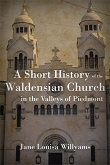
A Short History of the Waldensian Church in the Valleys of Piedmont begins with a brief account of the origin of the sect, continues with its rise into being, and ends with an account of its missionary work at the turn of the nineteenth century. Includes a prefatory essay by W. S. Gilly.
Next to that most primitive and sacred history of all, the records of which are only to be found in Scripture, there is hardly one subject of historical inquiry more interesting than that of the early and singular Church of the Vallenses of Piedmont. The particular object of Miss Willyams is highly commendable, and most deserving of success.
—The Historical Review
The name of Dr. Gilly will be a sufficient guarantee that the statements in this small but comprehensive volume may be received with confidence.
—Church of England Review
Jane Louisa Willyams (1786–1878) was the author of Protestants in the 16th Century and The Tower of the Hawk, as well as numerous books of poetry.
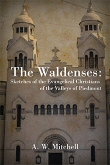
This history of the Waldensians includes an in-depth account of their beginnings, beautiful illustrations, and a detailed appendix which contains “A Confession of Faith of the Waldenses,” which bears the date of AD 1120, as well as extracts from other writings that also date back to the twelfth century.
Alexander W. Mitchell served as treasurer for the board of publications of the Presbyterian Church in the USA from 1840–1855.

History of the Waldenses succinctly describes the conflicts the Waldensians were engaged in and the martyrdoms they endured in defense of their faith and liberty. Wylie’s fast-paced work shows how a large measure of constitutional liberty and freedom of conscience now enjoyed by Italy was due in large part to the efforts of the Waldensians.
Dr. Wylie’s book will supply in a pleasing form, and gathered from a great variety of sources, information that will not only interest young readers, but that will also imbue them with the sacred love of liberty and truth.
—British Quarterly Review
The wonderful experiences of these people, who chose to worship God according to the dictates of their own conscience amid the darkness of the Middle Ages, is thrillingly told, and will be an inspiration to the people of this day and age. It will instill into the heart of the reader a keen sense of right, and an unfaltering determination to abide by it, against all intimidation or flattery.
—Liberty
James Aitken Wylie (1808–1890) was educated at Marischal College, University of Aberdeen, before studying at the University of St. Andrews under Thomas Chalmers. Wylie was the editor for the Free Church Record for eight years, and authored numerous books, including The Awakening of Italy and the Crisis of Rome, The History of Protestantism, and The Papacy: Its History, Dogmas, Genius, and Prospects.
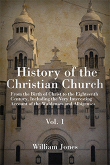
Volume one of The History of the Christian Church traces the history of the Christian Church from the time of the apostles to the twelfth century. Jones includes helpful chronological tables illustrating the succession of popes, emperors, kings, and princes by century.
The work before us, contains a great variety of curious and highly interesting particulars. The author states facts correctly, without the slightest attempt to misrepresent. Various well-written episodes add greatly to the value of the work, which is enlivened by a number of very interesting anecdotes.
—Monthly Review
William Jones (1762–1846) founded the Theological Repository in 1800 and The Christian Advocate in 1809, and served as an editor for The New Evangelical Magazine from 1815–1824. He authored numerous works, including A Dictionary of Religious Opinions, The Biblical Cyclopaedia, Lectures on the Apocalypse, The History of Modern Europe, and The Works of Mr. Archibald M’Lean: With a Memoir of His Life, Ministry, and Writings.
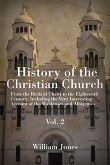
Volume two of The History of the Christian Church focuses on the history of the Waldenses and Albigenses, from the time of Peter Waldo, AD 1160, through the days of Wycliffe in the fourteenth century, and up to the end of the seventeenth century. Volume two also contains an 80-page appendix of letters from Waldensian clergy members.
William Jones (1762–1846) founded the Theological Repository in 1800 and The Christian Advocate in 1809, and served as an editor for The New Evangelical Magazine from 1815–1824. He authored numerous works, including A Dictionary of Religious Opinions, The Biblical Cyclopaedia, Lectures on the Apocalypse, The History of Modern Europe, and The Works of Mr. Archibald M’Lean: With a Memoir of His Life, Ministry, and Writings.
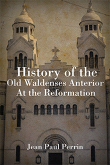
First published in the early 1600s, Jean Paul Perrin’s History of the Ancient Christians Inhabiting the Valleys of the Alps is considered a classic in Waldensian study. Perrin divides his account of the Waldenses into two parts:
- Origin of the Waldenses, and the Testimony Given of Their Faith and Probity
- History of the Waldenses, and of Their Various Dispersions
Jean Paul Perrin was a pastor in the French Reformed Church and also the author of The History of the Ancient Christians and Luther’s Forerunners.
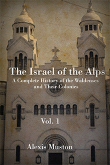
The Israel of the Alps gives a complete and in-depth history of the Waldenses, including their origin, manners, customs, religious organization, and sufferings. Volume one is divided into two parts:
- History of the Vaudois from Their Origin to the Time When They were Circumscribed within the Valleys of Piedmont Alone
- From the Time When the Vaudois were Restricted within the Limits of Their Valleys to the Date of Their Total Banishment
This is undoubtedly the most important work from the point of view represented, and for later Waldensian history is of great value.
—The Baptist Quarterly Review
Its accuracy and its learning entitle it to be accounted the standard authority in all things connected with the Vaudois Church. The author has been engaged upon it for upwards of 15 years, and in its production he has ransacked every repository whence information could be obtained upon the subject.
—Edinburgh Ecclesiastical Journal and Literary Review
The book is profusely illustrated with well-executed wood-cuts
—The Methodist Review
Their history, as traced here, presents examples of heroism, of devotion to principle, of fortitude and perseverance under suffering, to which the annals of the world furnish no parallel. Nothing could more clearly and amply vindicate the vitality of their faith, and the permanence of the principles for which the contended. We cordially commend this work, which adds to its other merits that of being really illustrated by server cuts, to the Christian public.
—The Christian Review
The volume commences with the earliest known history of the Waldenses, describes the whole of their persecutions, and finally shows their present condition in these peaceful times when martyrdoms are repugnant to the spirit of the age. The book will be read with deep interest, and sincere sympathy and admiration will be felt for a simple-hearted people who have through successive centuries braved everything in defense of a pure and holy faith.
—Stanford
The author writes very graphically; producing pictures often highly colored, yet we cannot say that by this process the truth is distorted. A history of a highly attractive character, notwithstanding the wickedness and sorrow it unfolds.
—The Journal of Sacred Literature
Dr. Muston’s labors must have be prodigious. His zeal, industry, conscientiousness, and minuteness are above all praise, and it is impossible to withhold warm sympathy from the patriotism which has led him—himself a Vaudois—to bestow so much pains on the annals of his people.
—Literary Gazette
Alexis Muston (1810–1888) earned his DD from the University of Strasbourg and was ordained in 1833. In 1835 he was exiled from Piedmont and moved to Nimes, France, where he served as a pastor in the French Reformed Church. He authored numerous works about the Waldensians.
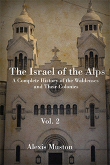
The Israel of the Alps gives a complete and in-depth history of the Waldenses, including their origin, manners, customs, religious organization, and sufferings. Volume two is divided into two parts:
- From the Return of the Vaudois into Their Own Country, to Their Civil and Political Emancipation in Piedmont
- Appendices
Alexis Muston (1810–1888) earned his DD from the University of Strasbourg and was ordained in 1833. In 1835 he was exiled from Piedmont and moved to Nimes, France, where he served as a pastor in the French Reformed Church. He authored numerous works about the Waldensians.
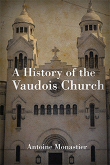
In A History of the Vaudois Church from Its Origin, and of the Vaudois of Piedmont to the Present Day, Antoine Monastier posits that the Vaudois Church is the link that unites Protestant Churches directly to the primitive Churches born from the apostles. Beginning with the state of the Christian Church at the accession of the emperor Constantine, Monastier provides a succinct history of the Christian Church in general before focusing on the origin of the Vaudois Church and its history up to the nineteenth century. Includes dozens of illustrations and maps.
The man who can read the whole without frequent and deep emotion, is not to be envied; and he who can peruse some portions of this tragical tale without a throb of the heart, or a tear in the eye, has but slight claims to humanity and magnanimity.
—The Christian Witness
The history of the Vaudois Church is replete with the most thrilling interest, and in the volume before us it is worthily and affectingly told. We are glad the work of M. Monastier has found a translator, and we commend the work to our readers as one of the fullest and most authentic accounts of the Vaudois ever written.
—The Scottish Congregational Magazine
We shall never grow tired of the history of these interesting people. Their story is fraught with illustrations of the faithfulness and loving-kindness of the Lord, though so large a portion of it is written in tears and blood. It is here told by one of their own pastors, a descendant of God’s martyred saints, a man, who, whilst their blood runs in his veins, has evidently caught the spirit of their humble and devoted piety. It discovers much research, is written with a full heart, and will not fail under the divine blessing, to edify the Church of God, whether in his own or in other lands.
—Evangelical Christendom
Antoine Monastier (1774–1852) was a minister of the Free Church of the Canton de Vaud, Switzerland. He spent 10 years researching and writing this book.
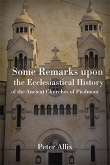
First published at the end of the 17th century, Peter Allix’s Remarks upon the Ecclesiastical History of the Ancient Churches of Piedmont was written in defense of the Albigensian and Waldensian Churches against charges of heresy by the Bishop of Meaux, Jacques-Bénigne Bossuet, in his History of the Variations of the Protestant Churches.
Peter Allix (1641–1717) was a pastor at Saint-Agobile Champagne, then at Charenton, before the revocation of the Edict of Nantes in 1685 forced him to relocate to London. In London, he started a Church for French exiles, and continued to preach and write. His other works included The Judgment of the Ancient Jewish Church against the Unitarians, Reflections upon the Books of the Holy Scripture, and Remarks upon the Ecclesiastical History of the Ancient Churches of the Albigenses.
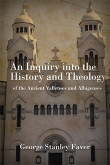
A refutation of Jacques-Bénigne Bossuet’s History of the Variations of the Protestant Churches, George Stanley Faber’s Inquiry into the History and Theology of the Ancient Vallenses and Albigenses is a thorough account of the history and theology of these two churches. Faber argues that the Waldensians had always held a system of doctrine and practice that was fundamentally the same as that of the Reformed churches of the sixteenth century.
George Stanley Faber (1773–1854) was a prolific author and Anglican theologian educated at University College, Oxford. In 1801 he was a Bampton lecturer at the University of Oxford. A controversial writer, he published over 20 books, most of which provoked discussion and debate.

The writer of the following treatises, Jean Rodolphe Peyran, was a native of the valleys of Piedmont, where both his father and grandfather had been raised in the office of moderator of the Waldensian Church. Like them, he served as a pastor and in the office of the moderator. This collection of his treatises, translated into English, covers Waldensian church history, provides biographical sketches of some of the Waldensian church’s most important leaders, connects the principles of the Waldensian church with those of the Reformation in the sixteenth century, documents that the ancient Waldenses perpetuated an episcopal form of church government, and more.
Written with force, animation, and elegance, with closeness of argument, great depth and variety of research, not infrequently both with eloquence and humor, and certainly without any mixture of the odium theologicum.
—The Christian Remembrancer
Jean Rodolphe Peyran (1752–1823) was pastor of Pomaret and moderator of the Waldensian Church.

War with the Saints focuses on the twelfth century and the Fourth Lateran Council when Pope Innocent III declared the Waldensians heretics. Around this time, more than 80 Waldensians were burned as heretics, and several centuries of persecution followed. Charlotte Elizabeth traces the horror and heroism of the Waldensian peoples as they struggled to survive the crusades threatening to destroy them.
She depicts, in glowing colors, the persecutions of the Albigenses, and every page displays the same vigorous style that characterized all her previous writings.
—Hunt’s Merchants’ Magazine and Commercial Review
It paints, in the colors of truth and with the picturesque expression flowing from the writer’s ardent heart, the persecutions of the Albigenses; the condition of that Church in the twelfth century, beset on all sides, but apprehending no evil—dwelling lovingly in the midst of a people devoted to the gentler arts of a land of beauty and of song; marked out as a prey by Innocent III, who knew that the circulation of the Word of God in a rural district might shake the pillars of his throne, and grind his gigantic power into dust.
—Sartain’s Union Magazine of Literature and Art
This last tribute of such a gifted pen will be read with thrilling interest.
—The Baptist Memorial and Monthly Record
She thinks deeply and accurately, is a great analyst of the human heart, and clothes her ideas in the most appropriate and eloquent language.
—Albany Argus
Charlotte Elizabeth Tonna (1790–1846) who published under the name Charlotte Elizabeth, was an author of history, poetry, fiction, and religious tracts. She worked as an editor for The Protestant Annual, The Christian Lady’s Magazine, and The Protestant Magazine. Her numerous books include Falsehood and Truth, Dangers and Duties, and Judea Capta: An Historical Sketch of the Destruction of Jerusalem by the Romans.
Reviews
10 ratings
Allan Story
5/5/2017

Victor Robidas
6/27/2014
AeliusCicero
4/15/2014

Larry Proffitt (I
11/13/2013

Prayson Daniel
11/6/2013
Bobby Terhune
10/13/2013

Bill Shewmaker
10/8/2013

Robert J Smith
9/22/2013

RevSarge
8/5/2013

Doug
7/27/2013